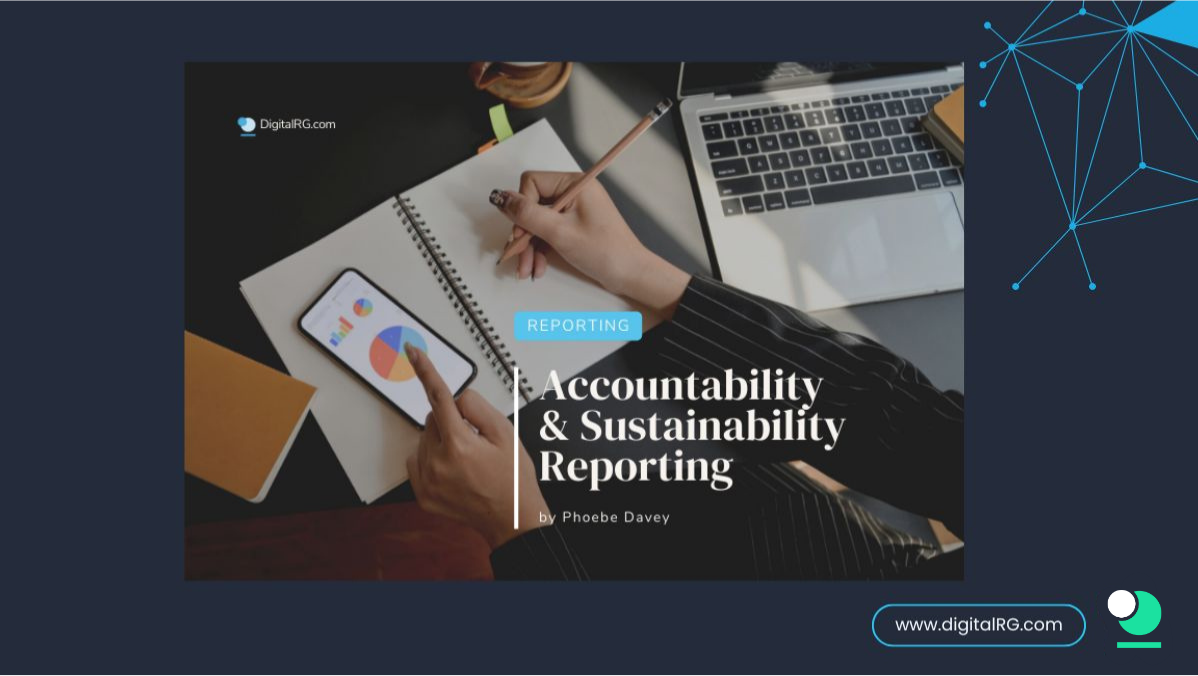Accountability, Transparency and Sustainability Reporting

Accountability, Transparency and Sustainability Reporting
Keeping track and reporting on the impact of your business, beyond financial metrics, is crucial to create stronger relationships with stakeholders through transparency.
Sustainability reporting is a type of non-financial reporting, in which information is collected and processed based on a company's non-financial indicators. It is an essential part of the journey to becoming a company that has a positive social and environmental impact.
As we know, what gets measured gets done. And what’s under the spotlight gets done better.
Unfortunately, it can be a confusing and daunting task, as there is no single set of standards, individual framework or best practice approach to sustainability reporting, either within the gaming industry or more broadly.
When its basics are understood however, as well as the frameworks and different approaches, sustainability reporting does not have to become a complicated task. It should be one which creates progress.
In this article, we cover the differences in how sustainability reporting can be done and provide an overview of the different well-accredited frameworks and guidelines.
Why do sustainability reporting?
Sustainability reporting allows a company to reflect on their impact and changes they have made, but also to be transparent about their gaps and areas needing improvement.
Demonstrating commitment to sustainability increases credibility, reputation, employee and customer retention.
Done well, sustainability reporting also improves stakeholder relationships, being an opportunity to improve their trust and gain their feedback.
Not only should sustainability reporting be done due to its benefits in improving a company and industry’s impact but, regulations have been introduced making it mandatory in many parts of the world. In 2013, the EU introduced the EC Directive on Disclosure of Non-Financial and Diversity Information. This requires companies with over 500 employees and those of public interest to disclose information on various ESG (Environmental, Social, and Governance) topics including the environment, social matters, employee treatment and human rights. In the UK, listed companies from 2013 have had to report on greenhouse emissions, diversity and inclusion and human rights. These regulations have impacted many of the larger companies within the gaming industry and hence it has seen a growth of reporting, but not necessarily an improved standard of reporting
Frameworks and guidelines for sustainability reporting
There is still a confusingly wide variety of guidelines and frameworks for reporting. Nonetheless each has their benefits and by choosing one and aligning with it, clear, concise and easy to digest reports can and have been made.
The most well-known is the Global Reporting Initiative (GRI) Sustainability Reporting Standards, KPMG reported that 73% of companies who report on sustainability use the GRI standards. It is very popular with many companies in the gaming industry, such as the Gaming Innovation Group Inc, Kindred and International Game Technology PLC(IGT), who all prepare their sustainability reports in alignment with GRI. The GRI standards provide companies with a specification to report on their ESG actions and impacts split into four parts.
Though not an explicit reporting framework, ISO26000 is a set of social responsibility guidelines that reporting is aligned with. ISO26000:2010 as the latest publication of the standards aims to promote responsibility through guidance on integrating the three pillars of Environmental Social Governance into business, through an easily applicable structure. An example of how this can be used for reporting can be found in Sharp’s 2019 CSR report which is organised around the seven core subjects of ISO 26000; Organisational Governance, Human Rights, Labour Practices, The Environment, Fair Operating Practices, Consumer Issues and Community Involvement and Development.
While fundamentally they aim to offer guidance in different ways, ISO 26000 and the GRI Reporting Standards both offer solid options for reporting and improving social responsibility.
The Integrated Framework on the other hand provides a framework for integrated reporting and thinking to progress both financial stability and sustainable development. For those wishing to integrate their sustainability reporting into an annual report, this goes further than a simple summary of information by chapter, demonstrating a way to connect and communicate financial and non-financial factors. It shows connected strategy and how a business creates and maintains value. Integrated reporting is used by large companies in the gaming industry such as FDJ and also smaller ones to report on their sustainability and responsible gaming actions.
The UN Sustainable Development Goals (UNSDGs) are a critical set of objectives that can be incorporated into sustainability reporting. The 17 SDGs, most recently set by the 2030 Agenda for Sustainable Development and adopted by all UN member states in 2015, address 17 urgent global issues with the understanding that all must be addressed and tackled together in order to achieve sustainable development. It is important to note that the UNSDGs do not create a new reporting framework but can instead be integrated into existing reporting by looking at how the issues may relate to your business, prioritising and then integrating the goals into your own material issue objectives. There is a helpful guide on this, developed alongside GRI and the UN Global Compact aimed to directly assist Integrating the SDGs into Corporate Reporting.
Channels of reporting
Crucially sustainability reporting as a process defines the measurements, objectives, KPIs and progress of a company's sustainability strategy, on topics of environmental and social impact. It can be done alone in a self contained sustainability report, or as a form of integrated reporting.
A sustainability report can also take on different formats and companies do this in a variety of ways. To choose the best channel companies should be clear on the purpose of their reporting and who they are aiming to engage with. The best reports engage both internal and external stakeholders in the company's progress, but are also transparent about gaps and are open to dialogue on this. What is essential is not a sustainability reports format, but that it is presented by a company clearly and obviously for all its stakeholders to read.
And like many reports, track that people actually read it and find it useful. Track that it is also useful to improve your sustainability practices. A 200 pages pdf document that is written by an external communications agency, lives online but is never downloaded, not known by employees or management, is likely to be more of a waste of time and money and create frustrations.
Category
Other Blogs

January 03, 2022
ESG & how to get your teams behind you

January 20, 2026
Mystery Shopping en point de vente

January 20, 2026
Mystery Shopping no Varejo

January 20, 2026
Compras Misteriosas en el Comercio Minorista

January 15, 2026
Retail Mystery Shopping: Strengthening Age Controls and Responsible Sales at the Point of Sale


